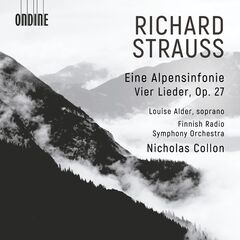Dieses Programm beginnt mit einer bemerkenswert spannungsvollen, packenden Interpretation von ‘Ruhe, meine Seele’, dem ersten der Vier Letzten Lieder. Doch die 38-jährige britische Sängerin Louise Alder überzeugt nicht nur in diesem Lied, es gelingt ihr, die vier Stücke sehr gut zu differenzierten und für jedes den richtigen Charakter und Ton zu finden.
Sie zeigt eine große Sensibilität und eine gute Begabung für dramatisches Erzählen. Sie wird von Nicholas Collon vorbildlich unterstützt, der mit dem Finnischen Radioorchester wunderbare Stimmungen schafft.
In der Alpensinfonie vermeidet Collon überflüssigen Ballast und konzentriert sich Wesentliches, auf Transparenz, kammermusikalische Feinheiten und dynamische Abstufungen.
Er differenziert die einzelnen Szenen gut und überzeugt insgesamt mit einer sehr detailreichen und spannungsvollen Interpretation, die den Naturlauten ebenso ihren Platz lässt wie den programmbezogenen Stimmungen.
Wohl kommt der Dirigent nicht an das Raffinement Karajans und auch nicht an die zwingende Klangopulenz und die gestische Dramatik Thielemanns heran, aber packende Spannung und großen Atem hat seine Interpretation, und sie besticht, wie gesagt, in erster Linie durch die Behandlung der Details.
This program opens with a remarkably exciting, gripping interpretation of ‘Ruhe, meine Seele’, the first of the Four Last Songs. But the 38-year-old British singer Louise Alder is not only convincing in this song, she also succeeds in differentiating the four pieces very well and finding the right character and tone for each one.
She shows great sensitivity and an innate talent for dramatic storytelling. She is supported in exemplary fashion by Nicholas Collon, who creates wonderful atmospheres with the Finnish Radio Symphony Orchestra.
In the Alpine Symphony, Collon avoids superfluous ballast and concentrates on the essentials, on transparency, chamber music subtleties and dynamic gradations.
He differentiates the individual scenes well and convinces overall with a very detailed and exciting interpretation, which gives the natural sounds just as much space as the program-related moods.
The conductor may not be able to match Karajan’s refinement or Thielemann’s compelling opulence of sound and gestural drama, but his interpretation has gripping tension and great breath and, as I said, it impresses first and foremost with its treatment of the details.





















